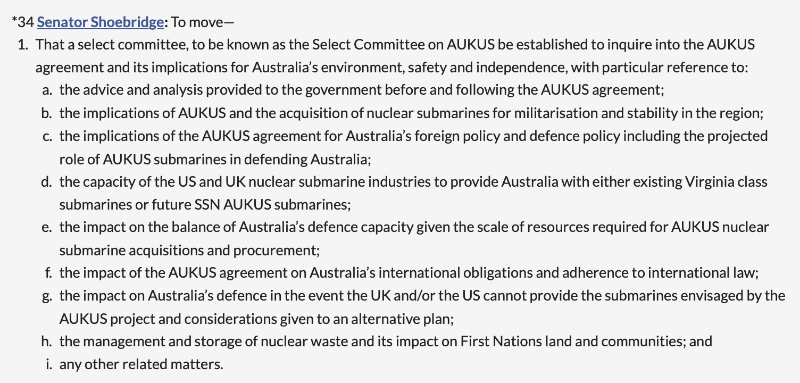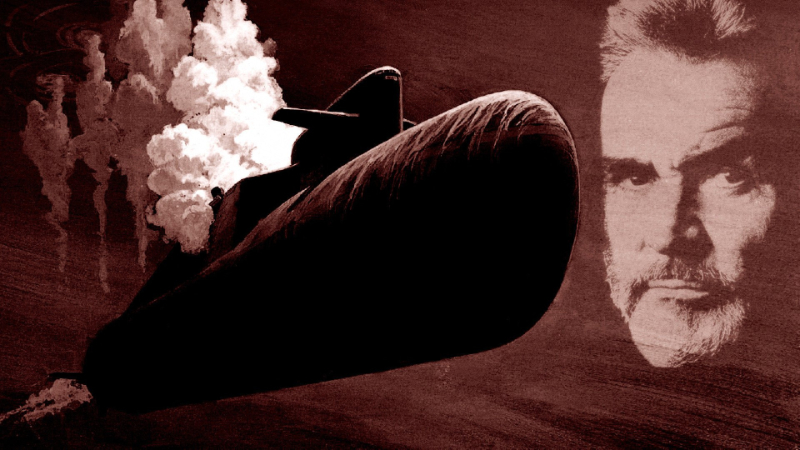Announcing a new one-sided subs-deal with the UK, resisting calls for a review, ignoring a US Admiral’s caution, while building hundreds of houses for US military. AUKUS is having a shocker. Former senator and submariner Rex Patrick reports.
On Friday, 25 July, Defence Minister Richard Marles and Foreign Minister Penny Wong stood beside their UK counterparts at a brief press conference in Sydney. They answered questions on a new 50-year treaty-level agreement between the UK and Australia related to the AUKUS submarine scheme.
The journalists who attended the press conference were not in possession of the text of the agreement, which was not actually signed by Marles and UK Defence Secretary John Healey until the following day, and not in Sydney but rather in Geelong. Without the text of the treaty being released, no hard questions could be asked (see below).
Marles apparently thought it more important to have the text signed a day after the ministerial discussions so that the “Nuclear-Powered Submarine Partnership and Collaboration Agreement between the Government of Australia and the Government of Great Britain and Northern Ireland” could be informally named after his hometown, as “the Geelong Treaty”.
The whole stage-managed affair was one that would have left everyone feeling warm and fuzzy in the halls of Parliament, where rhetoric counts for more than reality.
Meanwhile, in US Congress
About the same time, the Geelong Treaty was being announced, news was breaking in Australia of the testimony to the United States Senate of the nominee to serve as the next US Chief of Navy, Admiral Daryl Caudle. What he had to say did not augur well for Australia eventually being provided with three US Virginia-class nuclear-powered attack submarines as envisaged under AUKUS.
“The question of Australia’s ability to conduct undersea warfare is not in question by me or by anyone,” the admiral told the Senate Armed Services Committee’s seapower subcommittee. “But as you know, the delivery pace is not where it needs to be to make good on the Pillar 1 of the AUKUS agreement, which is currently under review by our Defense Department”.
Caudle testified that “There are no magic beans.”
“We do have to understand whether or not the industrial base can produce the submarines required so that we can make good on the actual pact that we made with the U.K. and Australia, which is around 2.2., 2.3 Virginia-class submarines per year.”
“That’s going to require a transformational improvement, not a 10 percent improvement, not a 20 percent, a 100 percent improvement.”
Of course, none of this was really news. The US Congressional Research Service and numerous other well-informed observers have been spelling out these facts for some time, but Prime Minister Anthony Albanese and Defence Minister Marles remain wilfully blind to the facts. Having put all their political chips on AUKUS, they don’t want to see or hear anything negative. Instead of a pause, they’ve been writing taxpayer-funded cheques to gift United States shipyards.
They quietly slipped the US Government another non-refundable $800M last week – following on from a non-refundable $800M in February.
Rudd talking the AUKUS talk in Washington, but is the US walking?
No control, no warranty
By Monday, the ‘Geelong Treaty’ had been tabled in the Parliament.
A read of the treaty documents revealed the completely lop-sided nature of the partnership with the UK. Whilst Australia gets to have a bit of a say, the UK get to decide the design of SSN-AUKUS. Australia will be buying and building a British design, and the success, delivery schedule, and cost will be absolutely dependent on the United Kingdom’s currently run-down and struggling submarine industrial base.
And if it doesn’t work in the end, there is no warranty.
Calls for inquiry
During the election campaign, a number of cross-benchers and the Greens started calling for an AUKUS inquiry, a call repeated this week by Senator David Shoebridge. He lodged a motion to establish a Select Committee into what is our most expensive and purportedly most important Defence procurement project ever.

Senator Shoebridge’s Select Committee Motion.
The inquiry motion was originally set to be voted on on Tuesday, but as the week progressed, Senator Shoebridge kept postponing it. That’s a signal that he didn’t have the numbers to get a ‘yes’ vote. The Labor Party has already ruled out an inquiry, and it looks like the Senator is trying to get the Liberal Party on board.
We’ll now find out the inquiry’s fate on 25 August. The Liberal Party are unlikely to support the inquiry. They want to criticise the government’s handling of the US alliance, but they have no intention of questioning AUKUS, which, after all, was first conceived by their man, Prime Minister Scott Morrison.
It’s an all-eggs-in-the-one-$368B-basket capability acquisition full of risk – but it appears as though there will be no oversight.
As the Parliament appears reluctant to review AUKUS, in true Trump tariff negotiation style, the US Defence Department announced its review of AUKUS would not be completed until “fall” (the next three months).
Housing bill waved through
To add icing on the cake, the government’s first Housing Bill in the 48th Parliament, voted through the House on Wednesday by the duopoly, was one to build houses, not for Australians, but for foreign military personnel and their families in Perth.
As Senator Shoebridge tried to have this Bill referred to a Senate Committee, he laid it out:
“In the last parliament, we saw Labor coming up with a million reasons they couldn’t do anything on public housing. They couldn’t help people out on rents, they couldn’t build public housing, and they kept saying it was all the Greens’ fault for not supporting their crap bills. Then, in this parliament, they start with a public housing bill. Well done, Labor! You bring a public housing bill into the chamber. You push it through the lower house. And do you know what public housing they’re building? They’re building public housing for US troops under AUKUS. That’s their public housing bill.”
“Please, minister, you haven’t explained in the bill how much this is going to cost; is it going to come from the Defence budget or some other budget?”
No answer was given, and no referral to a committee occurred.
The AUKUS week closed with some lobbying on Sky by former Secretary of Home Affairs, Michael Pezzulo. Pezzulo is officially disgraced, but is not without expertise on national security issues.
Pezzulo does know something about the financing of Australia’s defence capabilities, and he issued a blunt warning about the scale and urgency of Australia’s AUKUS commitments, saying the nuclear submarine program will demand a national effort on par with Medicare.
“It’s like having the military version of Medicare. It’s something that’s got to become an all-consuming, focused effort that transcends Commonwealth, state, territory governments into industry, academia, the training pipeline through both universities and vocational educational training institutions.”
All that statement does is roll out the trifecta. The US can’t deliver Virginia Class submarines to us; the UK submarine industry is a cluster fiasco; and Australia’s not ready. And, we will have to make AUKUS submarines our number one national priority if we are to have any chance of success.
In 2023 Paul Keating – without knowledge of the total $4.7B that is to be gifted to the United States, or the similar amount that is being gifted to the UK, nor the facts that the US is unlikely to deliver, and that we really don’t have any rights in relation to the SSN-AUKUS – called it “the worst deal in all history”.
Knowing what we know now, Keating was wrong. He should have said “dumbest deal in all history”.
I just want a Ferrari, sorry, a nuclear submarine, no matter the cost
Rex Patrick is a former Senator for South Australia and, earlier, a submariner in the armed forces. Best known as an anti-corruption and transparency crusader, Rex is also known as the "Transparency Warrior."

